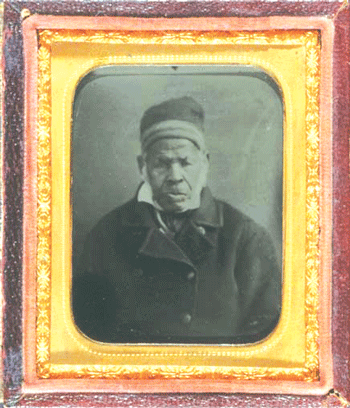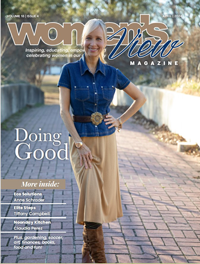 Fayetteville is full of interesting people, and always has been. From the Highland Scots who settled here in the 1700s to the present day citizens who live, work and serve in the community to make this town a better place, you don’t have to look far to find infl uences from around the world that have shaped Fayetteville into a town with international fl air.
Fayetteville is full of interesting people, and always has been. From the Highland Scots who settled here in the 1700s to the present day citizens who live, work and serve in the community to make this town a better place, you don’t have to look far to find infl uences from around the world that have shaped Fayetteville into a town with international fl air.
Beginning Nov. 4, our town is celebrating yet another fascinating historical fi gure — Omar Ibn Said (pronounced Sa’eed), with the dedication of a historical marker. The Museum of the Cape Fear is hosting a corresponding exhibit that will open at 10 a.m. on Nov. 4.
The exhibit will feature an original manuscript penned by Omar Ibn Said. A performance of The Life and Times of Omar Ibn Said at 71st High School at 7 p.m. will also be a part of the celebration.
According to the N.C. Department of Cultural Resources, Omar Ibn Said was born in Africa in about 1770, in the modern day country of Senegal, to a Muslim family and was educated in the Qur’an, Islamic practices and prayers. He also learned how to read and write in Arabic and knew some math, too.
Historians aren’t sure if Omar Ibn Said was convicted of a crime and sold into slavery by his family or if he was captured by an enemy tribe, but in 1807 Omar Ibn Said found himself a slave in Charleston, S.C.
After running away from his harsh master in 1810, Omar Ibn Said arrived in Fayetteville, where he was arrested and put in jail for being a run away slave. While in jail, he turned to his faith and used coals from the fi replace to write prayers to Allah on the walls and ceiling of his cell. Being an educated Arab, all of his writings were in Arabic and the citizens of Fayetteville were intrigued by the markings he made in the jail.
“They weren’t familiar with the writings, but it was obvious that this was an educated man,” said Museum of the Cape Fear Historical Complex Administrator David Reid.
Omar Ibn Said was purchased by James Owen of Bladen County and went to live with the family there. “Omar was held in high esteem by the family and treated quite well,” Reid added.
For years, Omar Ibn Said remained a practicing Muslim. Owen gave him an English copy of the Qur’an to help him learn English. Eventually, Owen, with the help of N.C. Chief Justice and Francis Scott Key, the author of our “National Anthem,” provided Omar Ibn Said with a Bible that had been printed in Arabic, hoping that he would become a Christian. In 1820, he joined First Presbyterian Church in downtown Fayetteville.
“The local citizens were very excited that Omar converted to Christianity,” said Reid. “Missionaries even offered to supply him with Bibles and tried to get him to go back to his native country to share the gospel, but he chose instead to remain in the states with the Owen family.”
Through the years Omar Ibn Said not only proved to be a mystery and an asset to the Owen family, but he also left some pretty signifi cant historical documents. He wrote a 15 page autobiography and also translated some religious passages like the Twenty-third Psalm and the Lord’s Prayer into Arabic.
“One of the most significant things about Omar Ibn Said is that he is the only slave that produced an autobiography in his native language,” said Adam Beyah, event coordinator and the former Imam of Masjid Omar Ibn Sayyid. Other autobiographies left by slaves were either dictated or written in English after they were taught to read and write in America.
“He was a very religious man, and it appears that perhaps in writing the biblical texts he was doing a comparative study of the Bible and the Qur’an.”
In addition to the exhibit at the Museum of the Cape Fear, which will run through Dec. 5, and the performance at 71st High School, there will be festivities through out the weekend to honor the memory of Omar Ibn Said.
At 10 a.m. on Nov. 5 there will be an offi cial unveiling of a Historical Marker dedicated to Omar Ibn Said in front of Masjid Omar Ibn Sayyid, 2700 Murchison Rd. followed by a reception at 11 a.m. and Jumu’ah Prayer (Congregational Friday Prayer) at 1:30 p.m. led by Imam Ibrahim Pasha, Atlanta Masjid. From 3-6:30 p.m., vendors will be open on the Masjid property. On Nov. 6 there will be workshops by scholars, including an Arabic workshop by Imam Darnell Karim. Vendors will also be on hand, and the event will be followed by a banquet at 7 p.m. at Masjid Omar Ibn Sayyid with guest speaker Imam Darnell Karim, Chicago, Il.
To find out more or to participate in the festivities, call the Museum of the Cape Fear at 486-1330.
Photo of Omar Ibn Said courtesy of North Carolina Collection, University of North Carolina Library at Chapel Hill.

 How to resolve AdBlock issue?
How to resolve AdBlock issue? 









